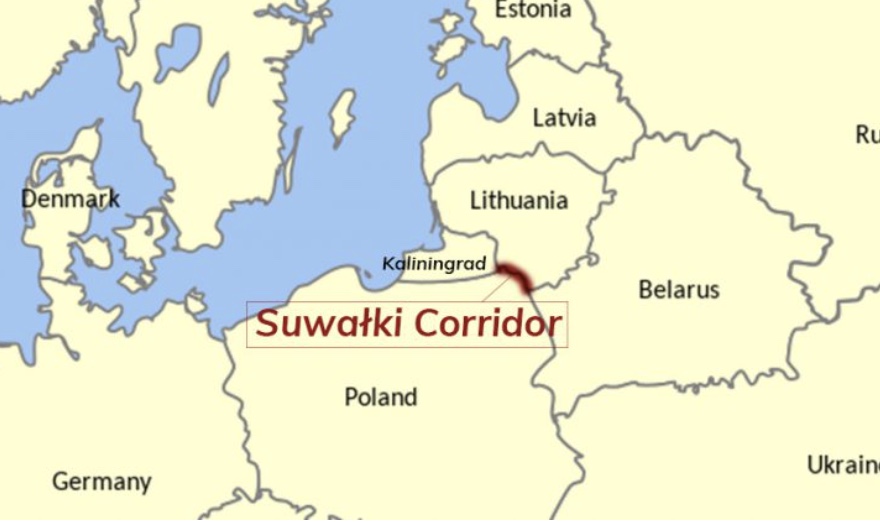(by Andrea Pinto) According to a military analyst and former Russian officer, Andrey Kartapolov, Russia wants to use its private militias to invade countries considered the "weakest links" of NATO.
According to the former officer the Wagner company could be used to conquer an area known as Suwalki corridor, a 65 km strip of land between Poland and Lithuania which is of strategic importance for NATO, the EU and Russia.
For the West, it is the only land connection with the three ex-Soviet Baltic republics Lithuania, Latvia and Estonia, who could be vulnerable to Putin if the current East-West tension worsens.
For Russia, control of the corridor would ensure a land link between the Baltic exclave of Kaliningrad, the main base of Putin's Baltic Fleet, and Belarus.
Andrey Kartapolov, now a deputy and chairman of the defense committee of the Russian parliament, told state TV: “It is clear that Wagner went to Belarus to train the Belarusian Armed Forces…but not only. There is such a place as the Suwalki Corridor. If anything happens, we badly need this Suwalki Corridor. An assault force stationed in Belarus is ready to take this corridor in a few hours”.
The goal is to immediately take this corridor, considered the "Achilles heel" or "soft underbelly" of NATO. As it could be the first point of contact in a third world war, the corridor has been defined “the most dangerous place on earth”.
An annexation of the corridor by Russia could trigger NATO's Article 5, with the inevitable consequences of an escalation between superpowers.
It is no coincidence that Poland is rapidly rearming due to the threat from Moscow and Germany is about to deploy 4.000 troops permanently in Lithuania, while NATO is strengthening its presence in the Baltic states.
Meanwhile tens of thousands of Wagner troops have arrived in Belarus in recent days.
More troops were seen on the road in Russia's Lipetsk region, heading towards landlocked states.
The Suwalki Corridor
The corridor between Poland and Lithuania was established after the Suwalki Agreement of 1920, but it was of little importance in the interwar period as at the time the Polish territories extended further to the north-east, while during the Cold War Lithuania was part of the Soviet Union and Poland belonged to the Warsaw Pact. But after the dissolution of the Soviet Union and the end of the Warsaw Pact, all the countries in the Baltic area joined both the European Union and NATO. Subsequently, both Russia and EU countries showed great interest in the corridor and in using it as a transit route for goods and people. In the 90s and early 2000s, Russia attempted to negotiate the creation of an extraterritorial corridor linking exclaves of Kaliningrad with Grodno in Belarus, but Poland, Lithuania and the European Union objected.
Tensions between NATO, Poland and Lithuania with Russia over the use of the Suwałki Corridor escalated in 2014 when Russia annexed Crimea and then escalated further after the Russian invasion of Ukraine in February 2022. These tensions have led to in spring 2022 NATO and Lithuania to strengthen the military presence in the corridor area and the European Union in June 2022 to block its use, effectively preventing the passage by land to and from Kaliningrad, as a consequence of the sanctions imposed on Russia for its invasion of Ukraine.
Some mercenary groups in Russia will be legalized
The Kremlin said on Friday it was considering granting one status to some of the more than two dozen private military companies active in Russia. Legally these shadow paramilitary groups do not exist, which allows them to operate parallel to the Russian military, sometimes performing high-risk "dirty" jobs for the regular army.
The number of private military companies active in Russia has continued to grow in recent years, spurred by the need to conscript soldiers to fight the war in Ukraine and by the Kremlin's willingness to make these shadow armies an instrument of Russia's foreign policy.
Russia has 27 active private military companies, more than 70 percent of which were created after 2014, according to Molfar, a Ukrainian investigative and fact-checking website.
The energy giant Gazprom has recently created two private armies, known as Fakel (Torch) and Plamya (Flame). The mission of these private armies is to protect the company's assets abroad, but also to support the Russian forces in Ukraine. Since November last year, the Russian Orthodox Church has also been funding its own PMC, whose volunteers are said to have taken part in the Kremlin's war in Ukraine.
"The number of PMCs could continue to grow, especially after the end of the war in Ukraine," said Marcel Plichta, an international relations specialist at the University of St Andrews in the UK and a former US Department of Defense analyst. For the many Russians mobilized on the front lines, these private militias provide job opportunities and allow them to continue using the skills they learned in the field, he added.
According to a survey published by Molfar, about a quarter of Russian PMCs operate exclusively in Ukraine, while a dozen are present in different countries of the world, particularly in Africa. Their role is simple: to defend the interests of their leaders and those of the Kremlin. Similarly, Wagner's model is to seize natural resources in exchange for combat missions, military training, and intelligence.
“Wagner is unique from other PMCs because Prigozhin is not just a mercenary boss, but a businessman. In Africa he exploits the gold mines through his own companies, with his own employees and his own security service; then he exports the minerals to other countries. There are currently no other militias with the same capabilities,” Plichta stressed.
Subscribe to our newsletter!
